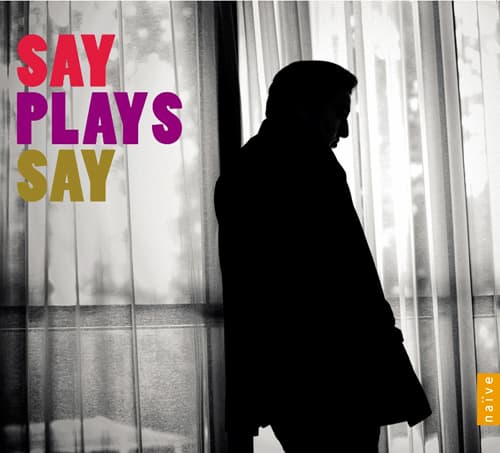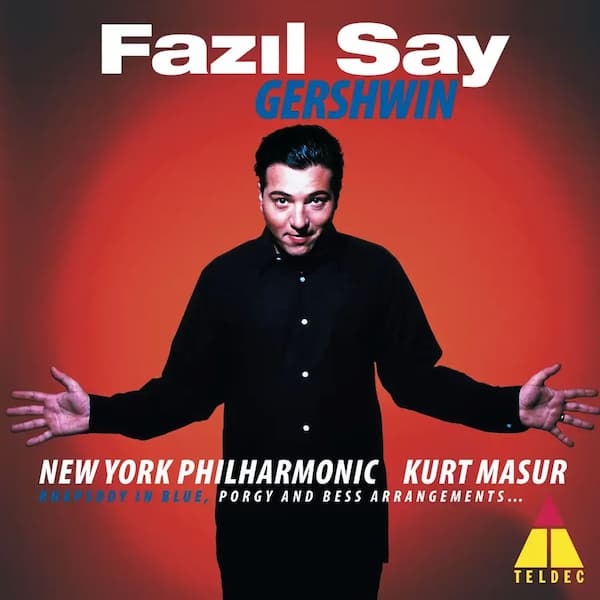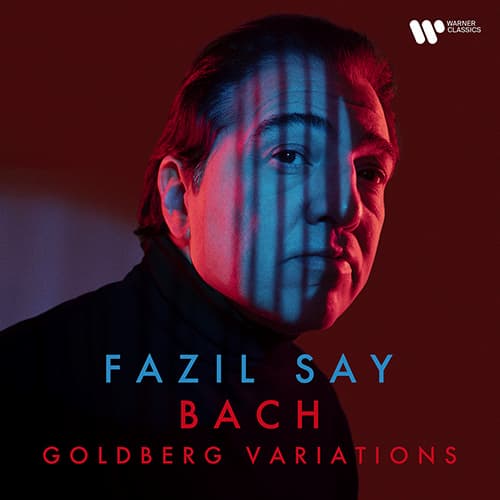Turkish pianist Fazıl Say, born on 14 January 1970 in Ankara, has compiled a discography notable not only for its impressive range of classical repertoire but also for his own compositions. His ability to blend traditional Turkish sounds with classical forms makes his recordings both innovative and deeply connected to his cultural roots.

Fazıl Say
Say strongly believes that music is a path to social change, a bridge between Western and Eastern cultures, blending and transforming both. In his performances, he brings a sense of passion, drama, and technical prowess that continues to captivate listeners worldwide. To celebrate his upcoming birthday, let us sample some of his most acclaimed recordings.
Fazıl Say Plays Say: Troy Sonata, “Achilleus”
Say Plays Say

In 2005, Naxos released “Say Plays Say.” It is a pivotal album in Fazıl Say’s discography as it primarily focuses on his own compositions. The featured works demonstrate Say’s unique ability to blend Eastern and Western musical traditions, often incorporating the rhythms and scales of Turkish folk music into classical frameworks. His bold approach to merging these influences gives the album a distinctive, innovative quality that has been widely praised by critics.
Gramophone wrote, “This recording is a testament to Say’s virtuosity and musical identity. His compositions display a fusion of influences that shape his unique voice, and his pianistic ability shines in every piece.” The central piece on the album is “Black Earth,” particularly praised for its dramatic power and thematic depth. In addition, it reveals a remarkable emotional depth, blending contrasting elements of lightness and gravity.
Fazıl Say: Black Earth, Op. 8 (Fazıl Say, piano)
Rhapsody in Blue

For Say, “music should always come out as an improvisation, as a composition in itself is an improvisation. The composer tries, tries again, and then finds something he likes and develops it. Playing should imitate this process of improvisation. That is why there is always a search for freshness in my performances.” Say certainly brought that sense of freshness to his performances and recordings of George Gershwin’s Rhapsody in Blue.
Released by Deutsche Grammophon in 2013, this recording has been widely praised for its technical brilliance, expressive depth, and unique flavour he brings to this iconic work. Critics loved his blending of the “piece’s jazzy core with a classical sensibility that doesn’t dilute the work’s swing.” To be sure, Say’s jazz-inflected approach manages to maintain the vigour and spontaneity of the original while delivering a technically flawless interpretation.
Fazıl Say Plays Gershwin’s Rhapsody in Blue
Goldberg Variations

Fazıl Says’ recording of the “Goldberg Variations” is unconventional, to say the least. His technical command of the keyboard is consistently praised as it allows him to navigate Bach’s intricate counterpoint and demanding passages with ease. However, his romanticised and expressive interpretations, marked by rubato and dynamic liberties, have been polarising.
While some critics praise these qualities as a fresh and engaging take on Bach’s music, others feel that such expressive freedom undermines the clarity and intellectual rigour traditionally associated with Bach.
Fazıl Say is a known advocate of interpreting Bach’s music, compositions that “transcend simple musicality and speak to the soul.” He adores both the precision and emotional depth, respecting the structure while also finding the humanity and feeling embedded in it. His willingness to explore the emotional core of Bach’s music offers a compelling and distinctive perspective, making Bach’s timeless compositions resonate in new and exciting ways.
J.S. Bach: Goldberg Variations, BWV 988 (Fazıl Say, piano)
Say Plays Beethoven

Say’s interpretations of Beethoven have been met with a range of critical reactions, reflecting both admiration for his technical virtuosity and occasional reservations about his expressive choices. Known for his emotional depth and romanticised interpretations, Say’s readings of Beethoven’s piano works showcase his ability to fuse classical technique with a dramatic, often personal, musical expression.
The Beethoven recordings have garnered attention for their passion and virtuosity but have also sparked some debate over their degree of expressive freedom. As the New York Times reported, “Fazıl Say brings a fresh, personal voice to Beethoven’s piano sonatas. His approach is marked by an expressive freedom that works in his favour, adding drama and emotion to the music. While some might find his rubato and use of dynamics over the top, Say’s interpretation is filled with raw energy and intensity.”
For more of the best in classical music, sign up for our E-Newsletter



